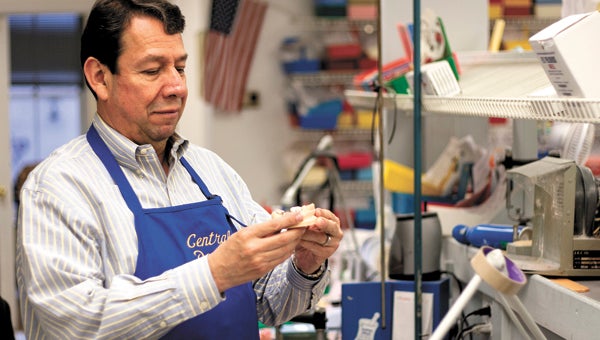Pearly whites
Published 12:45 pm Thursday, May 29, 2014

Bill Barrera fell into the work of making dentures by accident, and soon found he had a taste for it.
This craftsman makes people’s smiles
Bill Barrera is in the business of improving other people’s smiles.
But he’s not a stand-up comedian, or a photographer. He’s not a dentist, either, but you’re getting warmer.
If you’ve ever gotten a denture, partial, bridge or crown in the Hampton Roads area — especially in Suffolk — there’s a good chance you’re wearing his work.
Barrera’s Central Dental Laboratory makes dentures, partials, bridges and crowns that dentists order. He has two drivers that spend all day, every day, picking up impressions of patients’ mouths from dentists across Hampton Roads. Then his staff of eight goes to work in a second-floor lab in the heart of downtown Suffolk.
It’s not an easy job.
“Sometimes it’s very difficult to reproduce what God gave us,” Barrera said. But, he added, it’s important work.
“It improves people’s appearance, the way they look, the way they feel, their self-esteem,” he said.
Barrera is a native of Bogota, Colombia. He moved to New York with his mother when he was 17.
About five years later, he visited friends in Virginia and decided to stay.
“When you come to Virginia, everybody likes you,” he said of the South’s hospitality.
He got into the denture business soon after moving to Virginia.
“I was going to school for business administration,” he said. “Friends of mine owned a dental lab, and I used to come in and help them out. But I needed something to make a living.”
He started working at various dental labs, crafting smiles for folks all over the area. At one of the first labs where he worked, he met Brenda Wright, with whom he would later partner to buy Central Dental Laboratory from an older couple.
Wright retired from the business more than a year ago, making it all Barrera’s.
The process of making a denture takes about a week, he said, but less than half of that time involves actual work by an employee. The rest of the time, the material is being allowed to set.
Craftsmen work from the impression provided by the dentist to create a metal framework on which the piece will be built. They then build onto the framework and add fake teeth, which come in a variety of shapes, sizes and shades to match the patient’s natural teeth.
There are no schools for this work except for hands-on experience, Barrera said. Most folks, when they hear what he does for a living, say, “So, you’re a dentist?”
Many are surprised to hear their dentists do not make the dentures, Barrera said. But his lab works closely with dentists so they can get a better idea of the patient’s needs — without ever actually seeing the patient.
The lab once had about twice as many employees, Barrera said, but the economy and technology have affected the business. More people are putting off dental work, he said, because they are unable to pay for it.
Even so, Barrera said, “It has been enjoyable.”
Even thought he’s 62 and has a wife, two grandchildren and a 100-pound white German shepherd named Lola — a dog bed for her is one of the personal touches at Barrera’s work station, along with Dallas Cowboys memorabilia — Barrera won’t hear talk of retiring.
“Retirement’s not in my vocabulary,” he said. “What am I going to do? I don’t play golf. I like to travel some, but after 10 days, I miss my bed.”
Barrera and his wife still get back to Colombia every once in a while to visit family, he said. When he’s in the States, he’s an active participant in the Churchland Rotary Club, having been president in 2004-2005 and named Rotarian of the Year in 2002-2003.
And he still finds time to make hundreds of Virginians smile.






